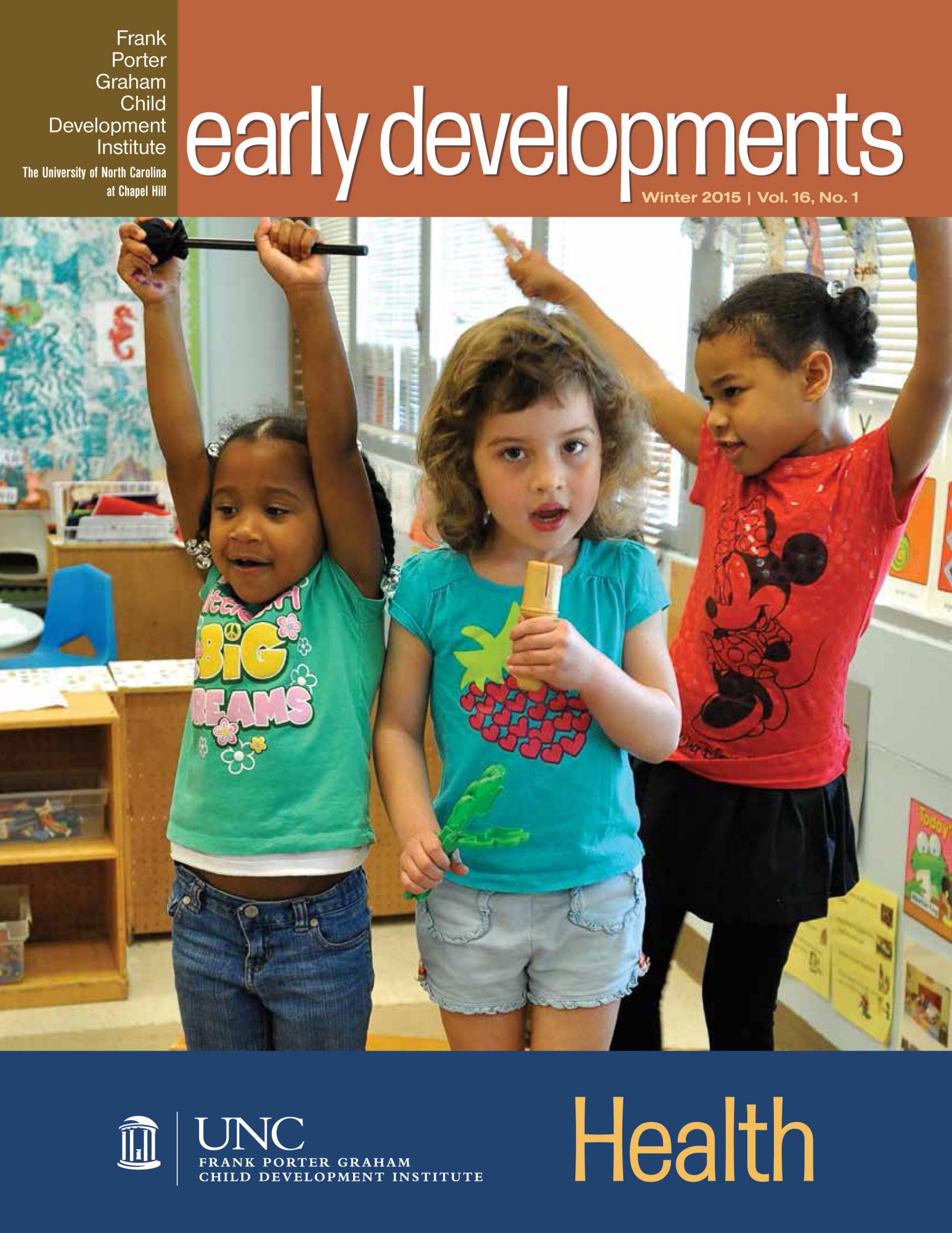Mental and Emotional Health
 from the Winter 2015 issue of Early Developments: Health
from the Winter 2015 issue of Early Developments: Health
As the practice of medicine evolves to accommodate many interrelated components of health, FPG continues to study how mental and emotional health are nested within a constellation of factors that influence outcomes.
This work is highly varied, as evidenced by the two stories we spotlight here. The first story looks at the power of mindfulness to overcome physical and emotional effects of childhood adversity. The second looks at the needs of students with one of the most common mental health disorders—in particular, at the supports enabling low achieving students with attention deficit/hyperactivity disorder (ADHD) to enhance their chances for academic success.
The content of FPG’s work also encompasses depression, substance abuse, prejudice, relationships, and much more, addressing and unlocking the critical roles mental and emotional health play in child and adult lives.
Be Well to Teach Well
With significant implications for early childhood education, new research reveals that a mindful disposition is associated with alleviating lasting physical and emotional effects of childhood adversity. A team of scientists from FPG, Temple University, Child Trends, and the Rockefeller University conducted the groundbreaking study—the first to examine relationships between childhood adversity, mindfulness, and adult health.
Robert Whitaker, professor of public health and pediatrics at Temple University, said the findings are especially important because adults who were abused or neglected as children typically experience poorer health.
“Previous research has shown that childhood traumas worsen adult health through changes in how the body responds to stress,” said Whitaker, who led the new study. He added that some people might adopt poor health behaviors, like smoking, to cope with stress.
As a visiting scholar at FPG, Whitaker collaborated with FPG scientist Kathleen Gallagher on the study, which surveyed 2,160 adults working for Head Start, the nation’s largest federally-funded early childhood education program. According to Gallagher, one of the study’s most striking features is its focus on Head Start teachers and staff, who are responsible for teaching and caring for some of America’s most vulnerable children.
“It’s essential for adults working with young children to be well—physically and emotionally,” said Gallagher. “Better health enables better relationships with children, and research has long demonstrated that good relationships are crucial for children’s learning and social-emotional development.”
 Whitaker explained that when teachers provide services to children who are experiencing trauma, it can reactivate in the adults an unhealthy stress response to their own childhood adversity. “This can potentially worsen the health and functioning of these adult caregivers,” he said.
Whitaker explained that when teachers provide services to children who are experiencing trauma, it can reactivate in the adults an unhealthy stress response to their own childhood adversity. “This can potentially worsen the health and functioning of these adult caregivers,” he said.
According to Whitaker, studies have shown the health benefits of learning to be more mindful—focusing on and accepting your reactions to the present moment. Nobody, however, had explored whether mindfulness in adulthood could offset the effects of adverse childhood experiences.
Whitaker’s team surveyed 66 Head Start programs across Pennsylvania, asking staff if they experienced emotional, physical, or sexual abuse as children or if they were exposed to other adversities such as household violence, substance abuse, or mental illness. He also asked about their current health, as well as their mindfulness—their tendency in daily life to notice what happens as it happens and to be aware and accepting of their thoughts and feelings.
“Nearly one-fourth of our Head Start respondents reported three or more types of adverse childhood experiences,” said Whitaker, adding that almost 30 percent reported having three or more stress-related health conditions, such as depression, headache, or back pain.
However, the risk of having multiple health conditions was nearly 50 percent lower among respondents with the highest level of mindfulness compared to those with the lowest levels, even for those with multiple types of childhood adversity. In addition, regardless of the amount of childhood adversity, Head Start workers who were more mindful also reported significantly better health behaviors (like getting enough sleep) and better functioning, including fewer days when they felt unwell mentally or physically.
“Our results suggest that mindfulness may provide some resilience against the poor adult health outcomes that often result from childhood trauma,” Whitaker said. “Mindfulness training may help adults, including those with a history of childhood trauma, to improve their own well-being—and to be more effective with children.”
The findings compelled Whitaker and Gallagher to begin developing Be Well to Teach Well, an online professional development program designed to help Head Start teachers improve their well-being and classroom interactions. “In-person training on mindfulness practices is difficult to implement on a large scale and very costly,” Gallagher said, explaining how the upcoming Be Well to Teach Well differs from other programs. “But by providing online training and ongoing coaching, we plan to help many more teachers to be well—and to develop the healthy relationships that are so important for positive child outcomes.”
“We need more research on delivering mindfulness training to teachers,” said Whitaker. “But there’s reason to believe a program for teachers like Be Well to Teach Well will help teachers and children in their classrooms flourish.”
Academic Support in High School for Low Performers with ADHD
 While the message from Be Well to Teach Well is clear—that healthy teachers can make better teachers—schools also must be able to match their programs and services to their students to best meet those children’s needs. New research on high school students with attention- deficit/ hyperactivity disorder (ADHD) provides critical clues about how schools can do this for an important subset of the student population.
While the message from Be Well to Teach Well is clear—that healthy teachers can make better teachers—schools also must be able to match their programs and services to their students to best meet those children’s needs. New research on high school students with attention- deficit/ hyperactivity disorder (ADHD) provides critical clues about how schools can do this for an important subset of the student population.
The study revealed that high school students with ADHD are using an unexpectedly high rate of services for their age group, yet many low achievers with ADHD are not getting the academic supports they need. Scientists from FPG and several other universities published the findings in School Mental Health after examining data from the Multi-Modal Treatment Outcome Study for ADHD (MTA), a large, nationally- representative sample of students diagnosed with ADHD.
According to the National Institute of Mental Health, ADHD remains “one of the most common childhood disorders and can continue through adolescence and adulthood.” In addition to experiencing hyperactivity, people with ADHD have trouble focusing, paying attention, and controlling their behavior.
Desiree W. Murray, FPG scientist and lead author of the study, said previous studies have demonstrated that children with ADHD often have difficulty completing work and performing at the level of their actual academic ability.
“Prior research has shown that students with ADHD score 10-30 points lower than their peers on achievement tests, and 30 percent repeat a grade,” explained Murray. “High school students with ADHD take lower level classes and fail more courses than their peers.”
According to Murray, high school students with ADHD also are up to eight times more likely to drop out.
Murray (shown here) said the clear need for effective educational interventions for adolescent students with ADHD led her and her team to examine outcomes for these students, while looking at the high school services they use.
Her study found additional evidence revealing that students with ADHD function significantly worse than their peers on academic measures. Teachers rated high school students with ADHD as more aggressive and less academically successful, and these students’ test scores and grade point averages were lower than their peers’.
 Using survey data provided by school staff, Murray’s team determined that slightly more than half of all high school students with a history of ADHD receive some type of formal school services, six times as much as students without ADHD in the study sample.
Using survey data provided by school staff, Murray’s team determined that slightly more than half of all high school students with a history of ADHD receive some type of formal school services, six times as much as students without ADHD in the study sample.
Most of the services and accommodations for students with ADHD targeted academic performance through Individualized Educational Plans (IEPs) as part of special education programs. Only half of these students received behavioral supports or were taught learning strategies.
“Although school procedures for identifying academic impairment in this population appear to be working for the most part, our results also suggest that 20 to 30 percent of students with academic impairment and ADHD have fallen through the cracks,” Murray said. “There is a need for greater or more effective academic supports for a substantial minority of the students in our sample.”
Murray said that only about one-fourth of the interventions reported in the school survey have evidence behind them. “One of the most common supports we found, for instance, was allowing students to have extended time on tests—but there’s no clear evidence this helps improve performance among students with ADHD.”
The new findings enabled Murray’s team to make recommendations for high school support staff serving students with ADHD.
“Using more evidence-based strategies could help reduce the performance gap between students with and without ADHD,” she said. “These include teaching self-advocacy, self-management strategies, and specific study and organizational skills.”
Murray said that she and her team are generally encouraged by the “unexpectedly high rate of services” for high school students with ADHD in their study’s sample. However, if schools focused more on services backed by research, these students would be more likely to benefit.
“Evidence-based practices can help improve long-term outcomes for high school students with ADHD,” said Murray. “Providing effective services may contribute to increased graduation rates and successful transitions to adult life.”
Currently, Murray serves as FPG’s new associate director of research, as well as principal investigator on a new FPG project that is developing a semester-long health education curriculum for high schoolers to improve their health beliefs and behaviors and to enhance their academic success.
She also holds workshops at the PDC@FPG for professionals who plan to train teachers in the evidence-based Incredible Years Teacher Classroom Management Program. The program not only strengthens teachers’ management skills in classrooms with 3-8 year-olds, it also promotes children’s social, emotional, and academic competence, as well as reducing classroom aggression and lessening disruptive behaviors. Additionally, the curriculum helps teachers effectively collaborate with parents to support their school involvement, promoting consistency between home and school. Teachers even report decreased stress levels after attending the training.
More on Mental and Emotional Health
From prenatal drug exposure to teacher-student relationships, the following examples also show how FPG’s focus on mental and emotional health supports children, families, providers, administrators, and policymakers.
How Low-Income Mothers Manage Depression
This look at the rural South finds that most mothers reported having depressive symptoms currently or in the past. The women reported the primary causes to be relation- ships, financial issues, and parenting stresses; their strategies for managing symptoms of depression varied by race.
New Resources for the Children’s Bureau
Not only do these resources from FPG’s National Implementation Research Network contribute to child welfare, they also advance the field of implementation and evaluation through an extensive report, a brief offering key concepts for lay readers, and a compelling and complementary infographic.
Racial Discrimination and How Mothers Talk to Young Children
New research finds that mothers’ perceptions of racism are a significant predictor of how they interacted with their young children during a picture-book session.
Strategies and Concerns of Successful Young African American Men
The route to early success for African American men requires adept navigation of conscious and unconscious racism, as well as capitalizing on available community and family supports, according to a new report from FPG’s Research, Policy, and Practice Alliance for Supporting Excellence in Black Children.
Supporting Young Children Who Experienced Prenatal Drug Exposure
This short article offers information for early intervention professionals about the growing challenges of illicit substance abuse and provides resources to assist anyone who is supporting young children who have been prenatally exposed.
Improving Child Addiction and Mental Health Outcomes
FPG is working with Canada’s Centre for Addiction and Mental Health (CAMH) to improve outcomes for children and youth. CAMH’s Provincial System Support Program is intended to create and build the implementation capacity of regional and local implementation teams, and FPG is helping CAMH to develop the infrastructure for sustaining and scaling up interventions in children’s mental health and addiction.
Increasing the Quality of Preschool Teachers’ Interactions with Children
A new study released this year examined the impact of an effective coaching model. Teachers exposed to a greater number of cycles of coaching showed more improvement in classroom interactions over the year, and, in particular, watching video exemplars was associated with growth in emotionally supportive behaviors—but not in classroom organization behaviors.
Child Care Instability and the Social-Emotional Adjustment of Children in Prekindergarten
Changes in child care may disrupt children’s emerging relationships and impede social-emotional development, especially when changes occur during infancy and toddler- hood. This study of children from rural, low-wealth families examined child provider instability before age 3 and determined it was negatively associated with teacher ratings of children’s social adjustment at pre-kindergarten.
Conflict Levels in Teacher Relationships with Boys and African Americans
Boys and African American kindergartners experience increasing conflict with their teachers as the school year progresses, regardless of the teacher’s ethnicity.
Risk Factors and Their Impact on Parenting
Parenting deteriorates when rural families face a number of risk factors at once—and, as a result, children’s intellectual, emotional, and social development suffers.
Fighting Parents and Children’s Difficulty Regulating Emotion
Exposure to greater levels of inter-parental conflict, more chaos in the household, and more time in pov erty are key contributors to young children’s ability to recognize and modulate negative emotion.
The Stabilizing Influence of Success Coaches
In Catawba County, North Carolina, science and “Success Coaches” are helping to keep parents and kids together, and Hickory resident Kelley Walker is only half-joking when she says her Success Coach saved her sanity.
Preventing High-Risk Behaviors and Achieving Socially Significant Outcomes
This white paper from FPG’s National Implementation Research Network concludes that where physical health is concerned, people are beginning to understand that healthier lifestyles lead to longer, healthier and happier lives. However, the same progress has not extended to mental, emotional, behavioral, or social health—and evidence-based solutions to improve well-being in these areas hold great potential.
DS
